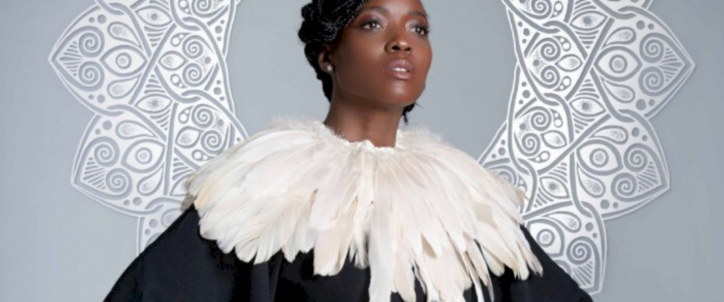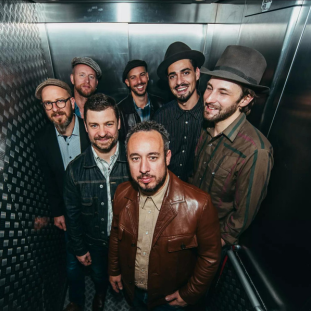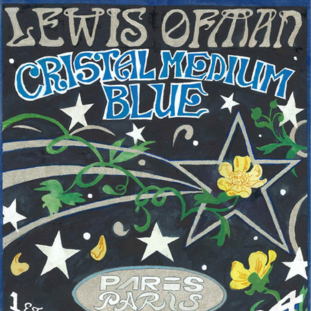
Awa Ly | The exclusive interview
With her smoky, velvety voice, Awa Ly is an exceptional talent on the French jazz and folk scene: incorporating RnB, soul and African music, Awa Ly follows her own path. A sign of her increasing musical maturity, new album Safe and Sound, released four years after her debut, is an important step in the career of this extraordinarily sensitive artist. On 27th February, we met in Berlin for an exclusive interview which covered her inspirations, emotions and experiences working in music.
Thank you for taking the time to talk. How are you finding Berlin?
I love Berlin. I’ve played here a few times. In 2014, I recorded an EP here with Greg Cohen, a great double bass player. We stayed for around ten days, but we were in the studio for most of the time. Still it was an incredible, intense experience and I really like that EP. So I have a good relationship with Berlin and I’m keen to stay a bit longer to really get to know the place.
How have German audiences been?
At the start I didn’t really know what to expect, the first tour here was a real surprise. People were so friendly and, after the show, the CDs all went, every time! It was really incredible because we hadn’t had time to do a lot of radio and TV promo. The audiences were simply curious and ready to discover a new artist they had never heard before. It’s my third time going on tour in Germany and I really can’t wait. I hope there are more dates to come.
How do you prepare for your shows? Is there a routine or is it different from one gig to the next?
I warm up my voice a bit, of course. But I also like meditating before shows. It calms me down a bit and then it’s really about enjoying ourselves. If the audience is having fun, we have fun too. My band is made up of jazz musicians, so we like to improvise and I want to give them the freedom to play with the mood. It’s enough to know the structure of the songs. Then, I can take us on a journey around them. Every show is unique. The voice is such a peculiar instrument: I wouldn’t necessarily say that the audience can feel whether I’m sad or tired, but I won’t sing in the same way. It’ll be different.
I can imagine it’s difficult to perform joyous songs when you’re sad or vice-versa…
Yes. There have been a couple of occasions when I almost haven’t gone on stage. The saying is that the show must go on, but when I found out that my aunt had died and that I had to play in Geneva the same day, I felt like I wouldn’t be able to do the gig. We were very close. I cried literally just before going on stage. And I had to tell the audience. They were so warm and supportive that in the end I was happy to be able to sing. Even now I find it difficult to talk about it, but it was an intense experience. The second time was just after the attacks in Paris. I was playing near Paris that day, but my hotel was just next to the place de la République, so not so far from the Bataclan. The next day, I was supposed to play in Normandy. In the end, we had to decide whether we wanted to play or not. But people called up to say they were coming to the show, because we had to resist and carry on. I was really unsure about it, but it ended up being an incredible show, calmer than usual, but I realised that the people there needed it too.
You’ve said before that music saved you in some way?
I think music saves me every day. Every day, terrible things happen in the world. But if there’s music, this world can’t be so bad. It’s not that music makes me forget all the terrible things, it’s not that, but it’s a comfort. And in some very difficult and personal moments, the music and the band are there to help me carry on. Music can heal. I hope to be able to do the same thing for others with my music.
Your new album is called ‘Safe and Sound’. What does the title mean to you?
‘Safe and Sound’ are words that allowed me to bring the twelve songs on the album together. It was the guideline. As you said, music saved me in a certain way and it still does it. I wanted to convey this feeling of safety, security and warmth… even if some of the songs are perhaps a little cynical and feature serious messages, they’re not an attack. They’re just a way of opening the mind and asking questions. I think we can discuss anything if we do it in a calm and positive manner. Music is a great medium for addressing more serious questions, for touching people’s hearts and making them think.
In the video for ‘Mesmerising’, there are girls running and a woman dancing. They express a certain strength or joy. What role does female energy play in this song or in your life in general?
We’re so strong! We don’t even have to say it anymore. No, women are so strong! And not only because they can bring life to this planet, but in other ways too. Sadly we were taught that we couldn’t do this or that, and that we had to meet a certain ideal, but we were brainwashed. I believe in our power to change things, to change society. I’m not the kind of feminist who wants to do everything alone: of course we have to fight the patriarchy, but I don’t think that we have to go up against men, we have to go forward with their support. I’m really optimistic and full of hope that equality will come. But that will only happen if women speak up and fight for future generations. The person in ‘Mesmerising’ is a force, it can represent many things. But the message is really about our strength, our female strength.
‘Close Your Eyes’, one of the songs on the new album, is also a very symbolic song. It’s quite metaphorical. Did you have something particular in mind when you wrote it?
For the video I was inspired by Alaa Salah, a young revolutionary from Sudan. I saw a photo of her least year which became famous around the world. She was singing revolutionary songs on a car in the middle of a crowd or people, before being taken away by the government. Not because of the song, but because she was part of the movement. It’s clear that the matter was much more serious and important for Alaa Salah. But I also wanted to talk about this kind of strength. And who knows what’s going to happen now in Sudan… it’s an example of the power of women, of the power of music and its role.
One last question: which musicians inspire you? Are there some German artists among them?
Sadly I must admit that I barely know any German musicians outside classical music. When I was younger I heard a lot of Nina Hagen. I really like her voice. But I grew up with soul, jazz and RnB. Of course I also listened to lots of Senegalese music. There were also a lot of French singer-songwriters like Brel, Brassens and Moustaki… so that’s the type of music I listened to.
A big thank you to Awa Ly for this frank discussion!
See also
 Malted Milk | A new album to celebrate their 25-year career
Having started out as a blues duo before becoming an authentic soul band, French outfit Malted Milk continue to electrify the music scene with their c...
Release
Malted Milk | A new album to celebrate their 25-year career
Having started out as a blues duo before becoming an authentic soul band, French outfit Malted Milk continue to electrify the music scene with their c...
Release
 Lewis OfMan | A new album to mark his sensational growth!
Cristal Medium Blue, the latest album by unique synth-pop artist Lewis OfMan, marks a new step in the evolution of the Frenchman’s sound. At the ten...
Lewis OfMan | A new album to mark his sensational growth!
Cristal Medium Blue, the latest album by unique synth-pop artist Lewis OfMan, marks a new step in the evolution of the Frenchman’s sound. At the ten...